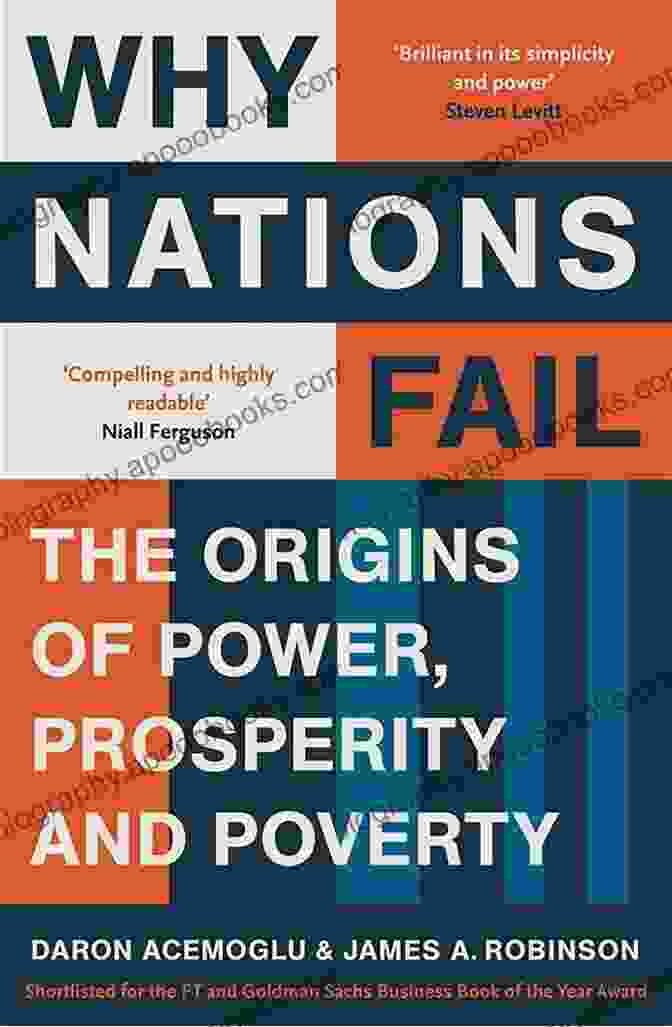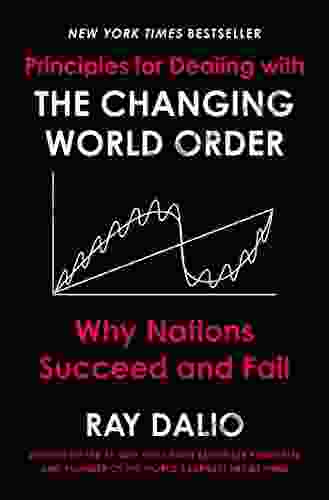Why Nations Succeed and Fail: Unraveling the Secrets of Economic Success

In the tapestry of human history, nations have risen and fallen, leaving behind a legacy of prosperity or decline. What separates successful nations from those that stumble? What factors contribute to economic growth and social well-being? In his groundbreaking book, "Why Nations Succeed and Fail," Daron Acemoglu and James Robinson embark on an epic quest to answer these fundamental questions.
4.6 out of 5
| Language | : | English |
| File size | : | 57125 KB |
| Text-to-Speech | : | Enabled |
| Screen Reader | : | Supported |
| Enhanced typesetting | : | Enabled |
| X-Ray | : | Enabled |
| Word Wise | : | Enabled |
| Print length | : | 570 pages |
Through a rigorous analysis of historical data and compelling case studies, Acemoglu and Robinson identify the crucial ingredients that foster economic progress and stability. They argue that the key lies not in natural resources, geography, or cultural traits, but in the institutions that shape a nation's political and economic landscape.
The Importance of Inclusive Institutions
At the heart of a successful nation lies a set of inclusive institutions that allow all citizens to participate in the economic and political process. These institutions protect individual rights, ensure property rights, and provide access to education and healthcare. When institutions are inclusive, they create a level playing field that encourages innovation, entrepreneurship, and social mobility.
Acemoglu and Robinson contrast inclusive institutions with extractive institutions, which concentrate power in the hands of a few elites. In extractive societies, the majority of citizens are denied equal opportunities and the benefits of economic growth are siphoned off by the ruling class. As a result, these nations often stagnate or decline.
The Role of Political and Economic Power
The distribution of political and economic power within a society is another critical factor in determining its success or failure. When power is concentrated in the hands of a small elite, it stifles competition, innovation, and social mobility. In contrast, when power is more evenly distributed, it fosters a more dynamic and prosperous society.
Acemoglu and Robinson explore the historical evolution of political and economic systems, from feudalism to capitalism. They argue that the transition to more inclusive institutions has been a gradual process that has often faced resistance from entrenched elites. Yet, it is through these struggles that nations have ultimately achieved lasting economic success.
The Impact of Social Capital
Beyond formal institutions, Acemoglu and Robinson also emphasize the importance of social capital in promoting economic growth. Social capital refers to the norms, values, and networks of trust that exist within a society. When social capital is high, individuals are more likely to cooperate, invest, and engage in collective action.
In nations with strong social capital, trust is widespread, corruption is low, and there is a sense of shared purpose. These societies are more likely to innovate, solve problems, and overcome adversity. Acemoglu and Robinson argue that social capital is a valuable asset that can complement formal institutions and foster economic progress.
Case Studies of Economic Success and Failure
To illustrate their theories, Acemoglu and Robinson present a series of compelling case studies. They examine the rise of successful nations such as the United States, the United Kingdom, and Japan. They also investigate the decline of nations such as the Soviet Union, Argentina, and Zimbabwe.
These case studies provide concrete examples of how different institutions and political economies have shaped the economic trajectories of nations. They show that there is no single recipe for success, but that inclusive institutions, a fair distribution of power, and strong social capital are common ingredients in prosperous societies.
"Why Nations Succeed and Fail" is a seminal work that has revolutionized our understanding of economic development. Acemoglu and Robinson's insights provide valuable lessons for policymakers, economists, and anyone interested in the factors that contribute to the success or failure of nations.
By highlighting the importance of inclusive institutions, a fair distribution of power, and strong social capital, this book offers a roadmap for nations seeking to achieve lasting economic prosperity and social well-being. It is a must-read for anyone who wants to understand the challenges and opportunities facing our world today.

Free Download Your Copy Today
To learn more about the groundbreaking theories presented in "Why Nations Succeed and Fail," Free Download your copy today. This book is essential reading for anyone interested in economic development, nation building, and the future of our global society.
4.6 out of 5
| Language | : | English |
| File size | : | 57125 KB |
| Text-to-Speech | : | Enabled |
| Screen Reader | : | Supported |
| Enhanced typesetting | : | Enabled |
| X-Ray | : | Enabled |
| Word Wise | : | Enabled |
| Print length | : | 570 pages |
Do you want to contribute by writing guest posts on this blog?
Please contact us and send us a resume of previous articles that you have written.
 Book
Book Novel
Novel Page
Page Chapter
Chapter Text
Text Story
Story Genre
Genre Reader
Reader Library
Library Paperback
Paperback E-book
E-book Magazine
Magazine Newspaper
Newspaper Paragraph
Paragraph Sentence
Sentence Bookmark
Bookmark Shelf
Shelf Glossary
Glossary Bibliography
Bibliography Foreword
Foreword Preface
Preface Synopsis
Synopsis Annotation
Annotation Footnote
Footnote Manuscript
Manuscript Scroll
Scroll Codex
Codex Tome
Tome Bestseller
Bestseller Classics
Classics Library card
Library card Narrative
Narrative Biography
Biography Autobiography
Autobiography Memoir
Memoir Reference
Reference Encyclopedia
Encyclopedia Tharran E Gaines
Tharran E Gaines Alfred Noyes
Alfred Noyes Kenneth J Fasching Varner
Kenneth J Fasching Varner Harry Bernstein
Harry Bernstein Alfred Green
Alfred Green Peter Afflerbach
Peter Afflerbach John Benson
John Benson Alex Kane
Alex Kane Alexandra Harney
Alexandra Harney Heather Hildenbrand
Heather Hildenbrand Ken Ochieng Opalo
Ken Ochieng Opalo Jim Harnedy
Jim Harnedy Sean Nelson
Sean Nelson Cathy Moore
Cathy Moore Lidermun Publishing
Lidermun Publishing Handugs Smithson
Handugs Smithson Barry Eaton
Barry Eaton Paul Reitter
Paul Reitter Barbara Klein
Barbara Klein Emily Tacrayon
Emily Tacrayon
Light bulbAdvertise smarter! Our strategic ad space ensures maximum exposure. Reserve your spot today!

 Ralph TurnerUnlock Your Musical Potential: Master Bass Scales with "Scale Colour System:...
Ralph TurnerUnlock Your Musical Potential: Master Bass Scales with "Scale Colour System:... Andy HayesFollow ·14.1k
Andy HayesFollow ·14.1k Julian PowellFollow ·2.1k
Julian PowellFollow ·2.1k Ernest PowellFollow ·3.1k
Ernest PowellFollow ·3.1k Cameron ReedFollow ·19.8k
Cameron ReedFollow ·19.8k Willie BlairFollow ·12.9k
Willie BlairFollow ·12.9k Griffin MitchellFollow ·8.8k
Griffin MitchellFollow ·8.8k Andrew BellFollow ·11.6k
Andrew BellFollow ·11.6k Carter HayesFollow ·2.2k
Carter HayesFollow ·2.2k

 Chuck Mitchell
Chuck MitchellUnveiling the Enchanting World of Ernesto Nazareth's...
A Musical Journey...

 Brent Foster
Brent FosterSusan Boyle: Dreams Can Come True
Susan Boyle's incredible journey from...

 Tom Clancy
Tom ClancyThe Movement and the Myth Provocations: Unveiling the...
In the realm of human...

 Edward Reed
Edward ReedUncle John's Bathroom Reader Plunges Into Texas: Bigger...
Uncle John's Bathroom...

 Justin Bell
Justin BellNew Perspectives on Virtual and Augmented Reality: A...
Dive into the Cutting-Edge World of...
4.6 out of 5
| Language | : | English |
| File size | : | 57125 KB |
| Text-to-Speech | : | Enabled |
| Screen Reader | : | Supported |
| Enhanced typesetting | : | Enabled |
| X-Ray | : | Enabled |
| Word Wise | : | Enabled |
| Print length | : | 570 pages |












